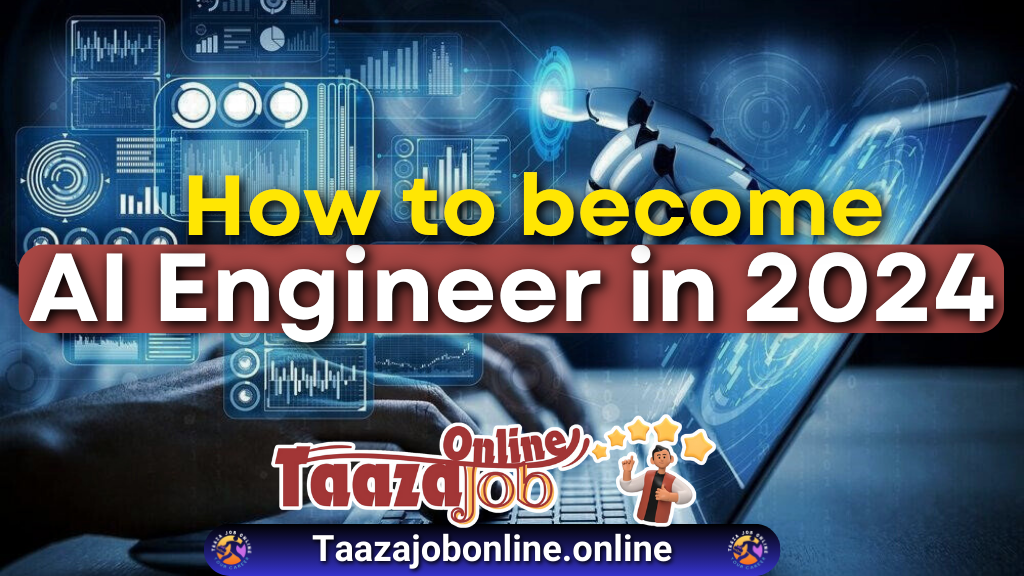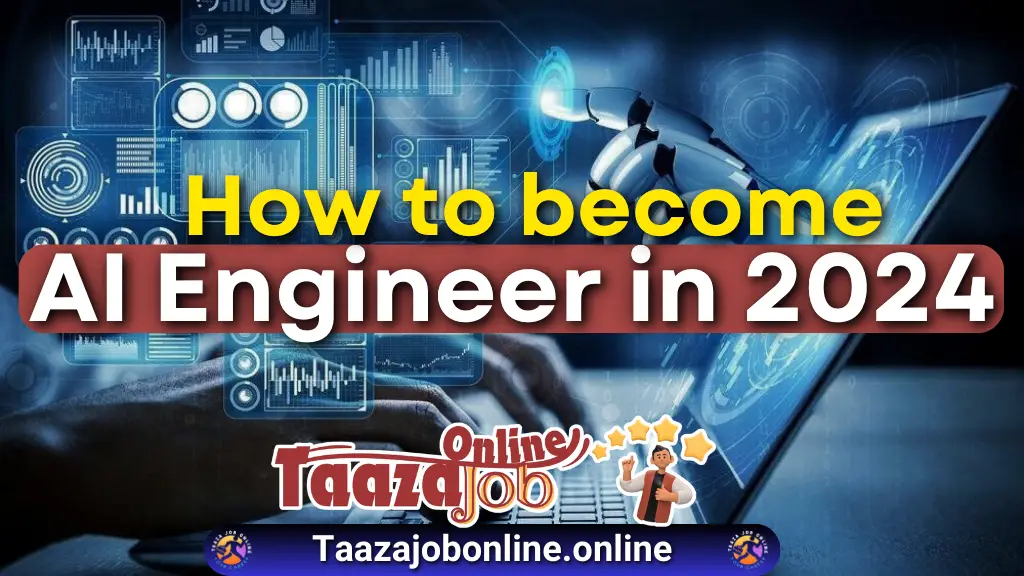AI Engineer in 2024: The field of Artificial Intelligence (AI) is rapidly evolving, and the demand for skilled AI engineers continues to grow. As companies across industries leverage AI to enhance operations, improve customer experiences, and drive innovation, the role of an AI engineer is becoming increasingly vital. If you’re aiming to become an AI engineer in 2024, this guide will walk you through the essential steps, from acquiring the necessary skills to building a strong portfolio and landing your dream job. Read Full article to know how to become an AI engineer 2024.
Why AI Engineering is a Top Career in 2024 – 2025
AI Engineer in 2024: AI engineering is a lucrative and in-demand career with a wide range of opportunities across sectors like healthcare, finance, technology, and more. AI technologies are transforming how businesses operate by enabling data-driven decisions, automating repetitive tasks, and unlocking new insights. According to industry forecasts, the demand for AI professionals(AI Engineer in 2024) is set to increase significantly, making it one of the most sought-after professions in the coming years.
Click here to Swap Face Using AI in one Just Click.
Essential Skills for Becoming an AI Engineer in 2024
Proficiency in Programming Languages:
Python: Python’s simplicity and extensive libraries, such as TensorFlow, PyTorch, and scikit-learn, make it the go-to language for AI development.
R: R is crucial for statistical analysis, which is a core component of many AI projects.
Java & C++: These languages are valuable for building scalable AI solutions and working on large-scale applications.

Strong Foundation in Mathematics and Statistics:
A solid understanding of linear algebra, calculus, probability, and statistics is essential for developing and fine-tuning AI algorithms.
Knowledge of Machine Learning Algorithms:
Familiarity with various machine learning skills, machine learning techniques, including supervised, unsupervised, and reinforcement learning, is critical. You should be comfortable with algorithms like regression, classification, clustering, machine learning skills and neural networks.
Data Handling and Processing Skills:
Competence in data extraction, cleaning, and preprocessing is key to ensuring that AI models perform optimally. Tools like Pandas, NumPy, and SQL are commonly used for data manipulation.
Expertise in Deep Learning:
Understanding deep learning frameworks such as TensorFlow, Keras, and PyTorch is vital for building and deploying complex neural networks.
Natural Language Processing (NLP):
NLP is a significant area within AI that involves processing and analyzing human language. Tools like NLTK, SpaCy, and Hugging Face are essential for working with text data.
Familiarity with Big Data Technologies:
Knowledge of big data tools like Hadoop, Apache Spark, and Cassandra is important for managing and analyzing large datasets.
Cloud Computing Skills:
Experience with cloud platforms such as AWS, Google Cloud, and Azure is crucial for deploying and scaling AI models in a cost-effective way.
Educational Pathways for Aspiring AI Engineer in 2024
Bachelor’s Degree in Computer Science or Related Fields:
A bachelor’s degree provides a strong foundation in computer science, covering essential topics like data structures, algorithms, databases, and software engineering.
Master’s Degree in AI or Machine Learning:
A master’s degree allows you to specialize in AI and machine learning, with advanced coursework in areas like deep learning, computer vision, robotics, and statistical analysis.
Online Courses and Bootcamps:
Online learning platforms like Coursera, edX, and Udacity offer courses specifically tailored to AI and machine learning. Bootcamps such as DataCamp, Springboard, and Le Wagon provide immersive, hands-on training in AI.
Click here to Swap Face Using AI in one Just Click.
Certifications to Enhance Your AI Engineering Career
Google Professional Machine Learning Engineer:
This certification validates your ability to design, build, and deploy machine learning models on Google Cloud, making it highly valued by employers.
AWS Certified Machine Learning – Specialty:
Amazon Web Services offers this certification to demonstrate expertise in building, training, and deploying AI models on the AWS platform.
Microsoft Certified: Azure AI Engineer Associate:
Ideal for professionals working with Azure, this certification covers areas like natural language processing, computer vision, and conversational AI.
Certified AI Engineer by AI4CE:
This certification offers a comprehensive understanding of AI principles and practical applications, recognized by employers globally.
Machine learning skills:
Machine learning skills can make you stronger in the AI Industry. Machine learning skills are the best way to become an AI Engineer in 2024.
Tools and Technologies for AI Engineer in 2024
TensorFlow:
TensorFlow, an open-source framework developed by Google, is widely used for creating and deploying machine learning models.
PyTorch:
Favored by researchers, PyTorch is known for its dynamic computational graph and is excellent for AI research and development.
Jupyter Notebooks:
PyTorch:
Favored by researchers, PyTorch is known for its dynamic computational graph and is excellent for AI research and development.
Jupyter Notebooks:
Jupyter Notebooks is a popular tool for creating and sharing documents that contain live code, equations, visualizations, and narrative text, making it ideal for AI projects.
GitHub:
GitHub is essential for version control and collaboration, especially in large-scale AI projects.
Keras:
Keras is a high-level neural networks API that runs on top of TensorFlow, making it easier to develop deep learning models quickly.
Docker:
Docker allows you to create, deploy, and run applications using containers, which is essential for maintaining consistent environments in AI development.
Click here to Swap Face Using AI in one Just Click.
Building a Strong AI Portfolio
Personal Projects:
Start with simple AI projects and gradually tackle more complex challenges. Building projects like chatbots, recommendation systems, and image classifiers can help you demonstrate your skills.
Contribute to Open Source:
Engaging with open-source AI projects on platforms like GitHub not only helps you learn but also enhances your visibility in the AI community.
Participate in Kaggle Competitions:
Kaggle competitions are a great way to apply your skills to real-world problems, gain experience, and build a portfolio that stands out.
Networking and Professional Development
Join AI Communities:
Engage with AI professionals on platforms like LinkedIn, Reddit, and specialized forums to expand your network and learn from others.
Attend AI Conferences:
Attending conferences such as NeurIPS, ICML, and CVPR provides opportunities to learn about the latest research and connect with industry leaders.
Follow AI Thought Leaders:
Keep up with the latest trends and developments by following AI experts on social media and reading their publications.
Job Hunting Tips for AI Engineer in 2024
Optimize Your Resume:
Highlight your technical skills, certifications, and relevant experience in your resume. Use action-oriented language and quantify your achievements.
Utilize Job Portals:
Search for AI engineering positions on job portals like LinkedIn, Indeed, and Glassdoor. Tailor your resume and cover letter for each application.
Prepare for Technical Interviews:
Technical interviews often include coding challenges, algorithm design, and problem-solving exercises. Practice with platforms like LeetCode, HackerRank, and CodinGame to sharpen your skills.
Enhance Your LinkedIn Profile:
Ensure your LinkedIn profile is complete, with a professional photo, a well-written summary, and endorsements from colleagues that reflect your expertise.
Future Trends in AI Engineering in 2024
Explainable AI:
As AI systems become more complex, the need for transparency and explainability will grow, especially in sectors like healthcare and finance.
Ethics in AI:
With AI’s expanding influence, ethical considerations and governance will be crucial in ensuring responsible AI use.
AI and Edge Computing:
The shift towards edge computing, where data processing occurs closer to the data source, will be significant for AI applications in the Internet of Things (IoT).
Quantum AI:
Quantum computing is poised to revolutionize AI by enabling solutions to problems that are currently unsolvable, making it a key area of development in the future.
Click here to Swap Face Using AI in one Just Click.
Conclusion
Pursuing a career as an AI Engineer in 2024 requires a combination of technical skills, practical experience, and continuous learning. By following the steps outlined in this guide, you can build a strong foundation in AI, develop a compelling portfolio, and position yourself for success in this dynamic field. Keep up with the latest trends, engage with the AI community, and stay committed to your learning journey. With dedication and persistence, you’ll be well on your way to becoming a successful AI engineer.




